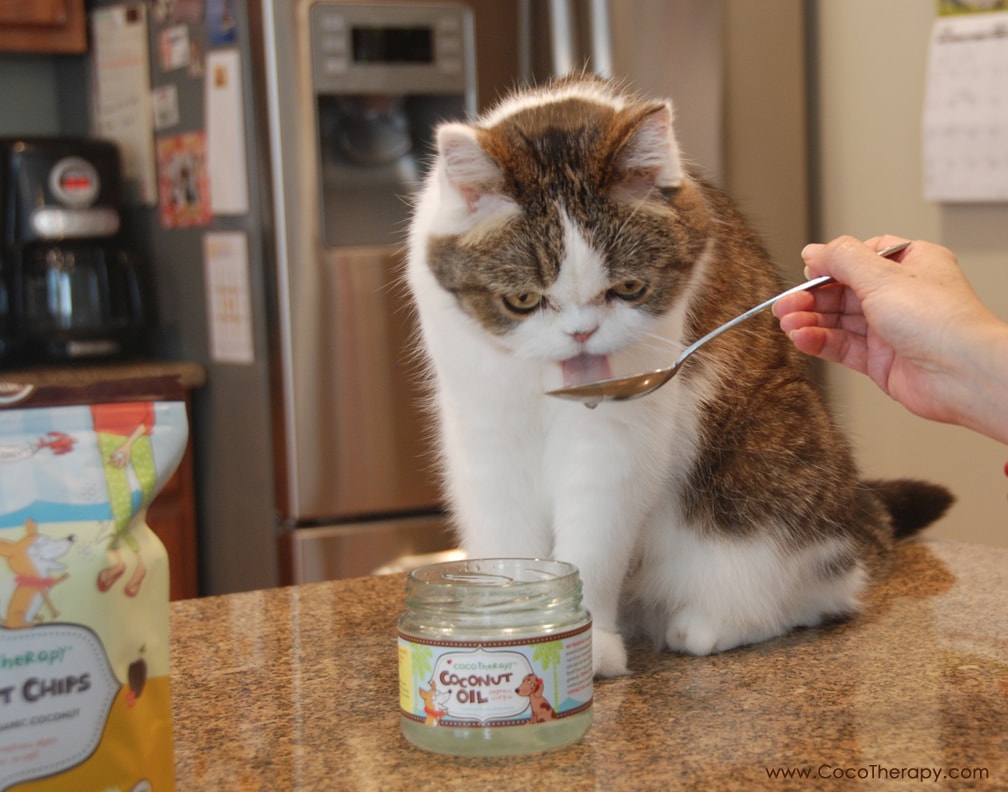The brain is the most important organ in the body. It’s often referred to as the command center of the body, because it controls organ function and biochemical function. It is also responsible for cognitive function, enabling animals to process information, learn, remember, and express emotions. But sadly, with age, both human and animal brains can degenerate.
Just as with humans, brain degeneration in pets can lead to dementia - a disorder of the mental processes that leads to changes in awareness and personality. This distressing illness is very hard to manage, and often results in severe reduction of a pet's overall quality of life.
In today's post we'll explore the reasons for brain degeneration in pets, and the symptoms that can go along with it. We'll also take a look at how coconut oil can help prevent - and even reverse - the process of mental decline.
What Causes Brain Degeneration in Pets?
The brain uses glucose as its primary source of fuel. Brain degeneration happens when the cells and neurons of the brain fail to effectively turn glucose into energy. Without energy the brain shrinks and its functions begins to decline. In effect, the source of "fuel" to the brain has been cut off - causing it to slowly die.
As pets age, they become more susceptible to developing a defect in glucose metabolism. This can cause Cognitive Dysfunction Syndrome (CDS), which is similar to Alzheimer's disease in humans.
A study by the Animal Behavior Clinic at the University of California, Davis has shown that 28% of dogs aged 11-12 showed one or more signs of CDS. This increased to 68% of dogs aged 15-16. The percentage of cats affected is lower, but they are still prone to developing the disease. A study conducted at the North Toronto Animal Clinic in Canada indicated that 28% of cats aged 11-14 showed at least one sign of CDS. For cats aged 15 or over this rose to 50%.

Symptoms of Cognitive Dysfunction Syndrome
The symptoms of CDS can be different for dogs and cats, but disorientation and confusion are primary symptoms that affect both animals. Here's an overview of some other common warning signs of CDS:
Dogs
- Disassociation with family members - seeks less interaction, shows a lack of enthusiasm
- Changes in sleep patterns - sleeps more during the day and less at night
- Changes in activity levels - extreme lethargy or sudden pacing around the house
- Disregard for training and house rules - loss of house-training, failure to alert family members that they need to go outside
Cats
- Changes in behavior - may avoid human contact, become excessively clingy, or show signs of irritability and anxiety
- Changes in activity levels - less-frequent grooming, loss of appetite, apathetic to surroundings
- Altered sleep patterns - sleeps restlessly, may become more vocal at night
- Loss of litter box training - forgets where the litter box is and eliminates around the house
Ketones - "Superfuel" for the Brain
As explained earlier, the underlying cause of CDS in pets is a defect in the way in which glucose in metabolized in the brain. Not all pets develop this defect, but age is a risk factor that increases its likelihood.
Fortunately, there's another source of energy for the brain - ketones.
Ketones are energy-producing molecules made from fats. The body can make them from stored fat, or from special fats known as medium chain triglycerides (MCTs).
Ketones act as an alternative fuel to glucose - a much more potent and efficient fuel. When ketones are available, it's like putting high performance gasoline into the tank of your car. You get better gas mileage, higher performance, less wear and tear on the engine, and less pollution.
Ketones bypass the defect in glucose metabolism and provide the brain with the energy it needs to function and develop properly. They also play a significant role in the maintenance, repair, and growth of brain cells.
Ketones are produced naturally by the body when blood glucose levels become low. Since glucose is the body’s primary source of energy, when glucose levels fall, the body starts mobilizing stored fat to produce ketones to maintain adequate energy levels.
But there's a problem ...
In order for ketone production to be triggered, blood glucose levels in the body must be low. This only happens when carbohydrate consumption is restricted. And since most commercial pet foods are high in carbohydrates, the ketones that support brain health are not produced naturally.
One solution is to feed your pet a carefully controlled species-appropriate diet, rich in fatty organ and muscle meats. A diet of this type is natural for cats and dogs, and allows the production of ketones that prolong brain health.
But there is another way to boost ketone production. Remember those medium chain triglycerides we mentioned earlier? It turns out that MCTs are converted into ketones regardless of blood glucose levels, so adding a rich source of MCTs to your pet's diet can raise blood ketone levels to the therapeutic levels needed to prolong brain health.
MCTs in Coconut Oil
There are very few dietary sources of MCTs, but the richest source by far comes from virgin coconut oil. Around 63% of the fatty acids in coconut oil are MCTs. Supplementing your pet's diet with a high-quality virgin coconut oil can raise blood ketones to levels that can support brain growth and development and prevent degenerative processes that lead to pets developing CDS.
Research has found that dogs fed a diet containing MCTs are less prone to cognitive decline, and even show improvement in memory and activity levels when being fed MCTs. This is great news for owners of older pets, but all pets can benefit from the addition of MCTs in their diet.
Supplementing your pet's diet with virgin coconut oil from an early age is a safe and effective way to guard against cognitive decline in later life. Check out our recent article How to Use Coconut Oil With Your Pets for the recommended dosages to feed.
If your pet is already showing signs of CDS, a treatment dosage of 1-2 teaspoons (5-10g) of coconut oil for every 5 pounds (2.5kg) of bodyweight is an appropriate daily amount to feed.
The therapeutic benefits of MCTs on pets showing signs of CDS vary depending on the levels of MCTs found in the coconut oil. For best results, experts suggest using a therapeutic virgin coconut oil that is 100% certified organic, Non-GMO, raw (true cold-pressed), and non-hydrogenated. Therapeutic-grade oil such as CocoTherapy coconut oil contains high levels of MCTs that support the brain. The cooking-grade coconut oils you'll find on most supermarket shelves will have little beneficial effect on cognitive health, as the levels of MCTs in cooking-grade coconut oils are often not sufficient to support cognitive function.
Do you have any questions about CocoTherapy therapeutic-grade coconut oil? Visit our FAQ page to find out more, or leave us a comment below.



